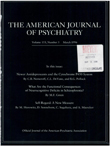Impact of acute psychiatric inpatient treatment on major depression in late life and prediction of response
Abstract
OBJECTIVE: The authors conducted a prospective study to examine the sociodemographic and clinical characteristics of elderly inpatients with major depression and their response to acute psychiatric hospitalization. The relation between the descriptive variables and clinical response was also investigated. METHOD: The subjects were 205 consecutively admitted inpatients, whose mean age was 71 years, who met the DSM-III-R criteria for major depression. Each subject received detailed physical, psychiatric, and mental status examinations, along with quantitative assessments of psychiatric symptoms and cognitive performance at admission and at discharge. Management of physical problems was optimized, and patients were treated with a combination of somatic and psychotherapeutic interventions. The average duration of hospitalization was approximately 1 month. RESULTS: Despite considerable medical and psychiatric comorbidity, the patients responded well to treatment, as reflected by a 50% reduction in the average score on the Hamilton Depression Rating Scale. Nearly one-half of the patients had experienced the resolution of their depressive symptoms by the time of discharge. Race, cognitive performance at admission, number of medical problems, use of ECT, and length of hospitalization independently contributed to the prediction of clinical response. Response to treatment was not related to the other sociodemographic variables examined or to any of the indexes of severity of depressive episode. CONCLUSIONS: Short-term psychiatric hospitalization offers an effective and efficient vehicle for the treatment of severe or complicated cases of major depression in the elderly, even when considerable medical and psychiatric comorbidity is present.
Access content
To read the fulltext, please use one of the options below to sign in or purchase access.- Personal login
- Institutional Login
- Sign in via OpenAthens
- Register for access
-
Please login/register if you wish to pair your device and check access availability.
Not a subscriber?
PsychiatryOnline subscription options offer access to the DSM-5 library, books, journals, CME, and patient resources. This all-in-one virtual library provides psychiatrists and mental health professionals with key resources for diagnosis, treatment, research, and professional development.
Need more help? PsychiatryOnline Customer Service may be reached by emailing [email protected] or by calling 800-368-5777 (in the U.S.) or 703-907-7322 (outside the U.S.).



